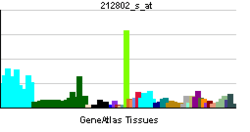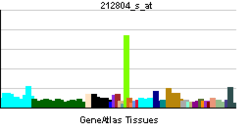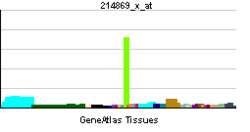GAPVD1
| GAPVD1 | |||||||||||||||||
|---|---|---|---|---|---|---|---|---|---|---|---|---|---|---|---|---|---|
| Identifiers | |||||||||||||||||
| Aliases | GAPVD1, GAPEX5, GAPex-5, RAP6, GTPase activating protein and VPS9 domains 1 | ||||||||||||||||
| External IDs | MGI: 1913941 HomoloGene: 32637 GeneCards: GAPVD1 | ||||||||||||||||
| |||||||||||||||||
| RNA expression pattern | |||||||||||||||||
   | |||||||||||||||||
| More reference expression data | |||||||||||||||||
| Orthologs | |||||||||||||||||
| Species | Human | Mouse | |||||||||||||||
| Entrez | |||||||||||||||||
| Ensembl | |||||||||||||||||
| UniProt | |||||||||||||||||
| RefSeq (mRNA) | |||||||||||||||||
| RefSeq (protein) | |||||||||||||||||
| Location (UCSC) | Chr 9: 125.26 – 125.37 Mb | Chr 2: 34.67 – 34.76 Mb | |||||||||||||||
| PubMed search | [1] | [2] | |||||||||||||||
| Wikidata | |||||||||||||||||
| View/Edit Human | View/Edit Mouse |
GTPase activating protein and VPS9 domains 1, also known as GAPVD1, Gapex-5 and RME-6 is a protein which in humans is encoded by the GAPVD1 gene.[3][4]
Function
GAPVD1 is Rab GTPase guanine nucleotide exchange factor essential for activation of RAB5A during engulfment of apoptotic cells.[5] GAPVD1 is also involved in the degradation of the epidermal growth factor receptor.[6] Gapex-5 mediated activation of Rab5 has been implicated in the insulin stimulated formation of plasma membrane phosphatidylinositol-3-phosphate.[7]
Structure
Based on sequence homology, mammalian Gapex-5 has been shown to have an amino-terminal Ras GAP domain, a central polyproline (SH3 binding) region and a carboxy-terminal Rab GEF domain. The RabGEF domain has been suggested to activate Rab5[8] and Rab31.[9]
References
- ↑ "Human PubMed Reference:".
- ↑ "Mouse PubMed Reference:".
- ↑ "Entrez Gene: GAPVD1 GTPase activating protein and VPS9 domains 1".
- ↑ Hunker CM, Galvis A, Kruk I, Giambini H, Veisaga ML, Barbieri MA (February 2006). "Rab5-activating protein 6, a novel endosomal protein with a role in endocytosis". Biochem. Biophys. Res. Commun. 340 (3): 967–75. doi:10.1016/j.bbrc.2005.12.099. PMID 16410077.
- ↑ Kitano M, Nakaya M, Nakamura T, Nagata S, Matsuda M (May 2008). "Imaging of Rab5 activity identifies essential regulators for phagosome maturation". Nature. 453 (7192): 241–5. doi:10.1038/nature06857. PMID 18385674.
- ↑ Su X, Kong C, Stahl PD (July 2007). "GAPex-5 mediates ubiquitination, trafficking, and degradation of epidermal growth factor receptor". J. Biol. Chem. 282 (29): 21278–84. doi:10.1074/jbc.M703725200. PMID 17545148.
- ↑ Lodhi IJ, Bridges D, Chiang SH, Zhang Y, Cheng A, Geletka LM, Weisman LS, Saltiel AR (July 2008). "Insulin Stimulates Phosphatidylinositol 3-Phosphate Production via the Activation of Rab5". Mol. Biol. Cell. 19 (7): 2718–28. doi:10.1091/mbc.E08-01-0105. PMC 2441665
 . PMID 18434594.
. PMID 18434594. - ↑ Su X, Lodhi IJ, Saltiel AR, Stahl PD (September 2006). "Insulin-stimulated Interaction between insulin receptor substrate 1 and p85alpha and activation of protein kinase B/Akt require Rab5". J. Biol. Chem. 281 (38): 27982–90. doi:10.1074/jbc.M602873200. PMID 16880210.
- ↑ Lodhi IJ, Chiang SH, Chang L, Vollenweider D, Watson RT, Inoue M, Pessin JE, Saltiel AR (January 2007). "Gapex-5, a Rab31 Guanine Nucleotide Exchange Factor that Regulates Glut4 Trafficking in Adipocytes". Cell Metab. 5 (1): 59–72. doi:10.1016/j.cmet.2006.12.006. PMC 1779820
 . PMID 17189207.
. PMID 17189207.
Further reading
- Su X, Kong C, Stahl PD (2007). "GAPex-5 mediates ubiquitination, trafficking, and degradation of epidermal growth factor receptor". J. Biol. Chem. 282 (29): 21278–84. doi:10.1074/jbc.M703725200. PMID 17545148.
- Hunker CM, Galvis A, Kruk I, et al. (2006). "Rab5-activating protein 6, a novel endosomal protein with a role in endocytosis". Biochem. Biophys. Res. Commun. 340 (3): 967–75. doi:10.1016/j.bbrc.2005.12.099. PMID 16410077.
- Jin J, Smith FD, Stark C, et al. (2004). "Proteomic, functional, and domain-based analysis of in vivo 14-3-3 binding proteins involved in cytoskeletal regulation and cellular organization". Curr. Biol. 14 (16): 1436–50. doi:10.1016/j.cub.2004.07.051. PMID 15324660.
- Beausoleil SA, Jedrychowski M, Schwartz D, et al. (2004). "Large-scale characterization of HeLa cell nuclear phosphoproteins". Proc. Natl. Acad. Sci. U.S.A. 101 (33): 12130–5. doi:10.1073/pnas.0404720101. PMC 514446
 . PMID 15302935.
. PMID 15302935. - Ota T, Suzuki Y, Nishikawa T, et al. (2004). "Complete sequencing and characterization of 21,243 full-length human cDNAs". Nat. Genet. 36 (1): 40–5. doi:10.1038/ng1285. PMID 14702039.
- Strausberg RL, Feingold EA, Grouse LH, et al. (2003). "Generation and initial analysis of more than 15,000 full-length human and mouse cDNA sequences". Proc. Natl. Acad. Sci. U.S.A. 99 (26): 16899–903. doi:10.1073/pnas.242603899. PMC 139241
 . PMID 12477932.
. PMID 12477932. - Nagase T, Kikuno R, Ishikawa K, et al. (2000). "Prediction of the coding sequences of unidentified human genes. XVII. The complete sequences of 100 new cDNA clones from brain which code for large proteins in vitro". DNA Res. 7 (2): 143–50. doi:10.1093/dnares/7.2.143. PMID 10819331.
- Bonaldo MF, Lennon G, Soares MB (1997). "Normalization and subtraction: two approaches to facilitate gene discovery". Genome Res. 6 (9): 791–806. doi:10.1101/gr.6.9.791. PMID 8889548.
- Adams MD, Kerlavage AR, Fleischmann RD, et al. (1995). "Initial assessment of human gene diversity and expression patterns based upon 83 million nucleotides of cDNA sequence" (PDF). Nature. 377 (6547 Suppl): 3–174. PMID 7566098.